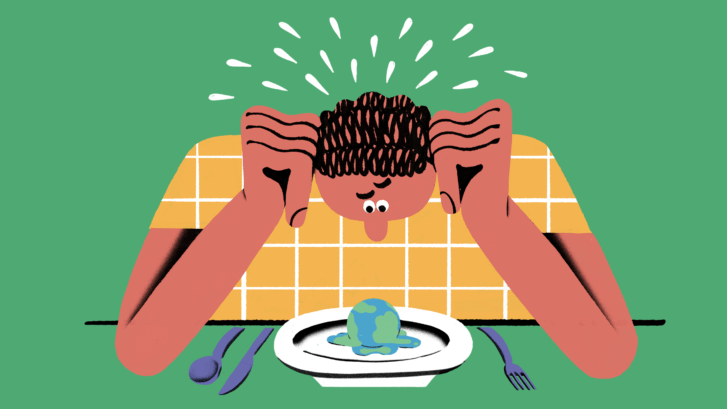As we prepare to celebrate the 51st Earth Day this week, our primary care concierge doctors in Jupiter know that many people are looking for ways to be kinder to the Earth without radically altering their entire lifestyle.
One way is to be more mindful of the carbon impact of the foods we eat. As an added bonus, eating more sustainably provides great health benefits, as well.
But you don’t have to make drastic changes to make a difference.
First, Some Facts
The World Economic Forum reports that, in a business-as-usual scenario, emissions from food production alone could use up all of the earth’s 1.5°C to 2°C carbon budget.
The World Health Organization (WHO) says that food production accounts for 20-30 percent of global greenhouse gas (GHG) emissions and as much as 66 percent of water usage.
According to Scientific American (SA), the Environmental Working Group (EWG) found that red meat such as beef and lamb is responsible for 10 to 40 times as many GHG emissions as grains and vegetables.
Livestock farming from cattle alone is estimated to generate about 20 percent of the GHG methane produced in the U.S.
In addition, a 2009 study found that cattle ranching is responsible for 80 percent of the deforestation of the Amazon rainforest.
Finally, SA reports that concentrated animal feeding operations (CAFOs or “factory farms”) can produce as much sewage waste as a small city.
The Wellness Advantage
In addition to the benefits for the planet, this way of eating provides another bonus: From a health perspective, plant-based diets are unquestionably better for the body than a diet high in meat, especially red meat.
According to Harvard Health, “an accumulated body of evidence shows a clear link between high intake of red and processed meats and a higher risk for heart disease, cancer, diabetes, and premature death.”
“The evidence is consistent across different studies,” says Dr. Frank Hu, chair of Harvard’s Department of Nutrition.
On the flip side, plant-forward diets have been shown to support the immune system, reduce inflammation in the body, reduce the plaques associated with Alzheimer’s disease, and improve the gut microbiome.
And, of course, incorporating more plants into your diet reduces the number of antibiotics you’re exposed to.
As SA reports, the widespread use of antibiotics to keep livestock healthy in the unnatural confines of those overcrowded CAFOs has led to the development of dangerous antibiotic-resistant strains of bacteria that can make some common infections impossible to treat.
Different Approaches
As we said, you don’t have to go totally vegan to help the planet or your health. There is an array of climate-friendly (or at least friendlier) diets to choose from.
Vegans, of course, don’t consume any animal products at all.
Vegetarians don’t eat meat but may eat some animal products such as eggs and dairy.
Flexitarians are, as their name suggests, more flexible in what they eat. Closest to vegetarians, they do occasionally consume meat.
Sustainarians eat a mostly plant-based diet but will eat meat if it is locally and humanely raised.
Reducetarians try to eat less meat for a variety of reasons, including their own health, the welfare of animals, and the environmental impact of their food. They’re also concerned with the concepts of biodiversity loss, and their food’s impact on water supplies and food workers.
Climatarians, also known as “climavores,” eat less meat and only a moderate amount of sustainable fish, avoid food waste and “air-flown” food, and choose high-welfare, organic meat.
Regenivores’ diets are similar to those above, especially reducetarians, but focus even more on whether it’s ethically produced. HuffPost reports they take into consideration soil health, workers’ rights, the impact of chemicals on the humans involved in food production, and the treatment of animals throughout the supply chain.
Other Ideas
Kind of confusing, isn’t it? If you don’t want to label your efforts to reduce your carbon footprint but just want to eat more sustainably, Canadian Living offers a simpler approach:
- Eat less meat. “A 2016 systematic review shows that following a diet low in animal products has the biggest impact on the environment of any dietary change, reducing GHG emissions and land use up to 70-80 percent, and water uses up to 50 percent,” the magazine reports. Keep in mind that beef has the largest carbon footprint of all animal products.
- Eat more plants. For your health and that of the planet, focus on vegetables, fruits, whole grains, legumes, nuts, and unsaturated oils, moderate amounts of seafood and poultry, and little red or processed meat, added sugar, or refined grains.
- Reduce food waste. Food waste ends up in landfills, where it generates about 25 percent of Canada’s methane gas. (The U.S. total is approximately 16 percent). Buy only what you need, and make a plan to use up leftovers as much as possible.
- Buy local food. This supports local farmers, reduces the need for transporting food long distances, and is more nutritious because fewer nutrients are lost during transit.
- Reduce kitchen garbage:
- Buy/use reusable grocery and produce bags.
- Carry a reusable water bottle.
- Use beeswax wraps instead of plastic wrap.
- Replace washable silicone bags instead of plastic bags.
This Earth Day, you can do your health and the planet a favor just by making a few simple changes to your diet.
For a suggested Earth Day menu, Earthday.org offers a sample here.










